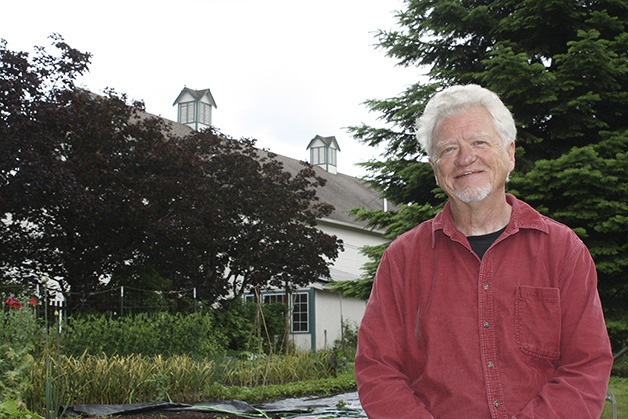Roger Thorson’s doing things on his 24-acre farm that his dairy-farming ancestors never dreamed of.
There’s the 18 solar panels on top of his 103-year-old barn’s gift shop. And the greenhouse and community garden that raises food for local families. Or the hay loft that Thorson turned into a guesthouse-slash-workshop space.
Thorson, who has gone beyond restoration at Carnation Tree Farm to stewardship for future generations, is the grand marshal of the 2013 Carnation Fourth of July Parade.
When a thirty-something Thorson came here 36 years ago, it was to answer the call of duty to his family. Today, his role here is as a connector and a communicator of people-conscious values.
Historic barn
It was in 1910 that Thorson’s great-grandfather Andrew Hjertoos, a Norwegian immigrant, built this huge barn of straight-grained, old-growth Douglas fir—“Wonderful stuff.”
The Hjertoos family raised dairy cows. The last dairyman in the family was Thorson’s great-uncle Bill, who died in 1955. After him, the family rented the place out to other farmers. When Roger bought it, it had been pastured out for corn, hay and peas.
Thorson was 32, working an engineer at the Livermore laboratories in California, when his grandfather, Frank Cox, called with a proposition: Buy the family farm to keep it in the family.
“Sure, I’ll buy it,” he replied.
But when he arrived here as an adult, he found that time had not been merciful to the Hjertoos legacy. The house and barn had gone to seed. With his grandfather pushing 90, unable to keep the place up, the roof was mostly gone. The second floor deck had been tar-papered over to keep out the rain. Run-down was an understatement.
“Boy, it looked spooky,” he said. “Anybody in his right mind would have run away from it.”
But Thorson stayed. Why? “It’s home.”
He wanted to get out of California, and was in danger of a generous enough pay raise that he might never have been able to leave.
So, he made a fresh start here, first trying to live off the land as a sheep rancher. “They’re cute,” but after two years, he was broke. He got a job as an engineer at Paccar, and turned the sheep farm into a tree farm, planting fast-growing Douglas firs to revive his fortunes, then grands, Frasiers—and Norway spruces, “because we had to.”
He spent 20 years restoring his family’s 1906 Queen Anne/Victorian house. The barn got a lot of attention over the past five years, when he created The Loft, a place for multi-day workshops, at the top level.
The Hjertoos barn is a county and state landmark, on the national register of historic places. Thorson received the John Spellman Historic Preservation Award in 2006 for his work preserving the huge building. It is still a lot to maintain.
Outside funding from King County and 4Culture helped with the materials. Thorson dedicated his time, and he’s never bothered to count the hours, or his dollars, as they’ve gone into the farm. “Years of my life” are in its walls.
Green work
Half-wild barn cats Buffy the Siamese mix and Cally the calico cat roam at will as Thorson walks around the greenhouses and the community garden that he founded here in 2006.
His neighbors come here to grow their own food, giving a portion of it back to local food banks.
“I’ve always felt a little guilty about growing trees instead of farming,” he said. “You’re not doing things that help” in the same vein as food for the people.
“It’s nice to have it productive in a good way,” he said.
Melissa Borsting, manager of Snoqualmie Valley Tilth, said Thorson is a great choice for grand marshal.
“He’s always giving back to the community,” she said. Thorson has done much to reach out and support the group, donating space for meetings and bringing the community together for fundraisers.
“He’s clearly committed to the history, the heritage of the Valley,” she added.
Thorson turned the roof of the Christmas tree farm’s gift shop into a solar garden. Eighteen panels generate 4.3 kilowatts per hour of electricity, meeting half the power needs of the farm. What he doesn’t use, he sells back to the state.
“I put my retirement money in that instead of the stock market,” Thorson said. “They’re paying me to generate power.”
Thorson is the treasurer of the Snoqualmie Valley Transition group, part of an international movement to break away from peak oil, combat climate change and generally live more sensibly.
It’s all about, says Thorson, “being more resilient, so you’re not affected by things that are out of our control.”
Thorson calls it a quiet period for the group, but there’s still a lot going on. He hosted the group’s seed exchange this spring. The Transition group just started another community garden in Fall City.
Out in the garden, a hummingbird flashes by his head.
“They love it here,” Thorson said. “I let everything go wild. Birds like that.”
Thorson considers his parade marshaldom quite an honor.
“I have to follow Isabel Jones,” Tolt Historical Society leader and last year’s honoree. “My gosh!”
He’s fine with riding in the parade, but when it comes to speeches—“If there was any talking, I would just forget it!”



